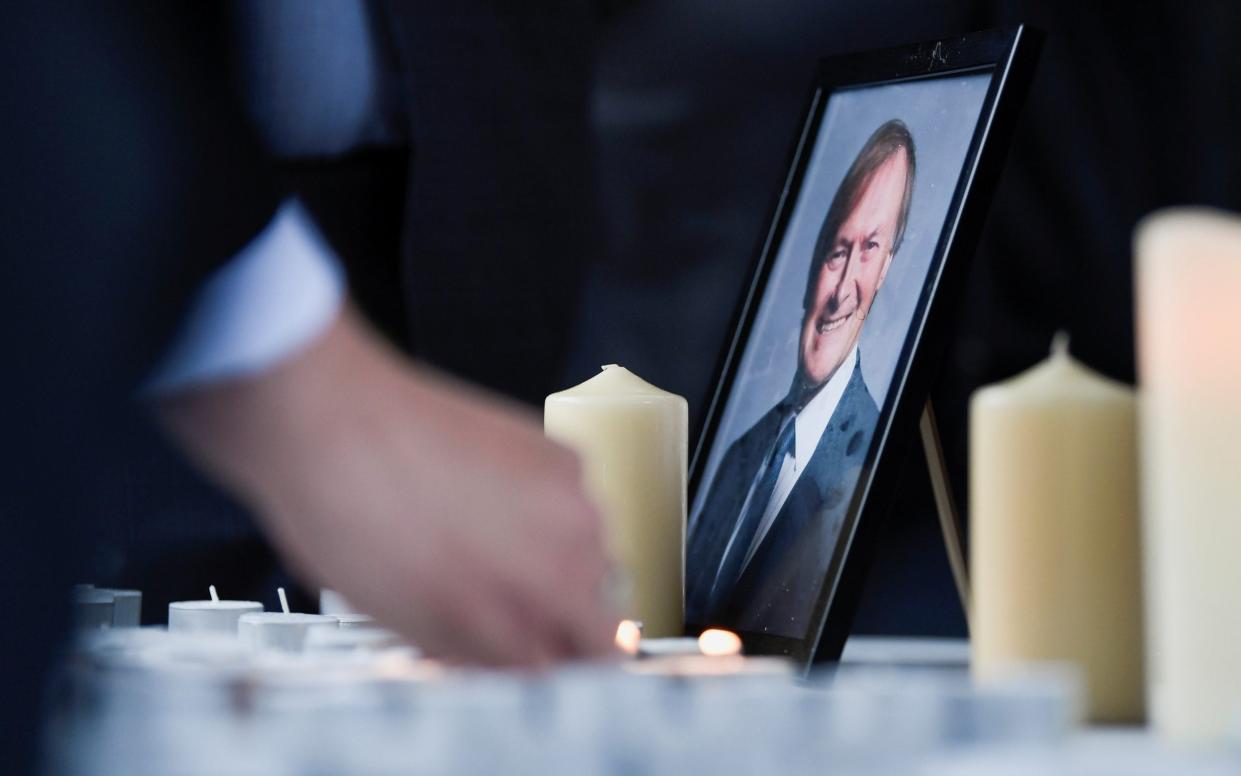Letters: Don’t let protection for MPs distance them from the electorate

- Oops!Something went wrong.Please try again later.
SIR – What are we to make of the appalling and senseless killing of Sir David Amess?
That it happened while he was going about his lawful business on behalf of others is heartrending. But are we to go the way of having armed guards surrounding our MPs?
Politicians cannot be protected without the goodwill of the people. We should all do more to achieve this.
Judith Scott Williams
Waldringfield, Suffolk
SIR – Is it not time for MPs to consider the language they use when describing their political opponents, and the message it sends? Angela Rayner’s recent diatribe is just one example.
Victoria Baillon
Hornblotton, Somerset
SIR – An essential and practical first step should be the installation of CCTV at the site of every surgery, and strong advertisement of its presence.
Karl Ludvigsen
Bury St Edmunds, Suffolk
SIR – I am appalled at the killing of Sir David Amess, but believe it would be foolish to replace MPs’ surgeries with telephone or Zoom consultations, as has been suggested.
Direct contact with one’s MP is a cornerstone of our democracy, and should not be negotiable. Service personnel, police officers, social workers and others take similar risks on a daily basis.
Huw Baumgartner
Bridell, Pembrokeshire
SIR – Our town has lost a beloved and constant servant. With his openness and generosity of spirit, Sir David Amess turned nobody away. He came to our street last year to celebrate the 100th birthday of a resident. He had many more engagements on that day, and would have made every one seem the most important.
A kindly and unforgettable man of the people, he represented all of us, regardless of political persuasion.
Barry Bond
Leigh-on-Sea, Essex
SIR – During my political career I knew three Conservative MPs who were subsequently murdered: Airey Neave, Ian Gow and Sir David Amess.
All three were distinguished and modest men totally committed to the service of the nation and their constituents.
The pointless and callous ending of their lives has deprived us of the very best.
John Pritchard
Ingatestone, Essex
SIR – Sir Keir Starmer could send a strong message by announcing that the forthcoming by-election will not be contested by Labour.
The other political parties should then follow suit.
Richard Kemm
Marseillan, Hérault, France
SIR – Surely the finest tribute to Sir David would be the granting of city status to Southend.
Edward Bacon
Beyton, Suffolk
Extra cash for GPs
SIR – I read with interest your report on the plan to devote £250 million of taxpayers’ money to encouraging GPs to offer more face-to-face consultations.
Thus, long-suffering patients are being obliged to pay more for a service that GPs are already being paid for not providing. It defies logic.
Dr Frederick Langley
Hessle, East Yorkshire
SIR – While it is important that those who wish to see their GP in person can do so, many people prefer telephone appointments when appropriate. They save time and travel, and avoid the risk of spreading germs at the surgery.
I hope that surgeries are not penalised purely on the basis of the proportion of patients seen in person, but that, if the patient’s preference is for a phone appointment, this is treated as a plus.
This would, however, lead to more bureaucracy, as it would be necessary to record and submit what type of appointment each patient preferred and what they got.
Richard Harrington
Ivinghoe Aston, Buckinghamshire
SIR – The BMA is complaining that part of the reason why GPs are “on their knees” is that they are carrying out extra duties (for a fee) as vaccinators.
Why are GPs still being used as vaccinators? The relatively simple procedure of giving an intramuscular injection can be carried out by many other healthcare providers.
Dr J R Drummond
Cellardyke, Fife
SIR – It’s all very well the Government telling GPs to get back to face-to-face appointments, but when will it tell the civil service to get back to work?
Alison Thomas
Leatherhead, Surrey
Energy Luddites
SIR – I heartily agree with David Fletcher (Letters, October 10) about Britain’s inadequate energy strategy.
Having our own independent supply is crucial, and I am disappointed by ministers’ and civil servants’ apparent resistance to technologies that could mitigate the impending energy crisis.
Neptune Energy’s suggestion of using gas of lower calorific value, currently left in the ground or flared off, is just one example of a solution that don’t appear to have been considered. Highview’s cryogenic energy storage systems and Gravitricity’s gravity-based storage devices are among the technologies that could help.
One can only hope that, should the Cop26 shindig coincide with power outages and industrial shutdowns (which are quite possible, especially while we are beholden to our erstwhile friends across the Channel), our Government’s humiliation might prompt it to consider some of these virtually shovel-ready options.
Andrew Main
Shaftesbury, Dorset
Kentish cadences
SIR – The Larkins, ITV’s adaptation of The Darling Buds of May by H E Bates, is set in rural Kent in the 1950s.
As a resident of this county for several decades, I was surprised not to hear anything of the old Kentish accent which, even today, is still quite prevalent outside major towns and commuting areas.
I appreciate that the Larkins themselves appear to be expatriate Londoners, but would they really have never encountered any true natives of their adopted county?
Ted Shorter
Tonbridge, Kent
Card is not king
SIR – In recent weeks I have needed to use cash (Letters, October 10) in a branch of Halfords and a branch of Wetherspoons, due to internet outages.
Both businesses had to turn away customers who did not have the cash to pay. Technology is great – but only when it works.
David Sutcliffe
Y Felinheli, Caernarfonshire
SIR – When I offered contactless payment for a purchase coming to £7.30 at my local newsagent I was asked to buy something else as he would accept only cash for sums of less than £10.
The retailer blamed the scale of charges for smaller transactions levied by his bank, adding that the nearest bank branch for paying in cash is some 15 miles away.
I left the shop empty-handed.
Trevor Watts
Chiltington, West Sussex
Woke research
SIR – “Citation justice” – a new requirement of academic journals for authors to include diverse races and genders in their references – should be resisted strongly.
Reference selection must be blind to all forms of bias, even well-intended ones, otherwise the credibility of research is compromised and progress stifled.
Dr David Slawson
Nairn
Creepy-crawly cure
SIR – The use of maggots in the treatment of wound care is not new. It was prescribed by many GPs – myself included – in the late 1990s and early 2000s, often following the advice of a well-informed district nurse.
Dr Robert Mitchell
Poulton-le-Fylde, Lancashire
SIR – Nearly 20 years ago my late husband broke his leg badly. There was a large open wound, which for a year was dressed at the local hospital but never healed.
In desperation he went to see a private doctor, who immediately suggested using maggots. Within a few short weeks it was completely healed.
We were amazed, and never knew why these magical creatures were not used more often.
Sue Johnson
Swanage, Dorset
How to befriend your local hedgehogs

SIR – Lorimer Burn (Letters, October 10) wonders if he could acquire a hedgehog to control the slugs in his garden.
My advice: put a dish of hedgehog food (available in pet shops) and a dish of water near your hostas – or whatever it is that needs protecting – and the hedgehog will come to you.
Keep the dishes clean. Put the food and water out before 6pm: the animal will be watching you. Hedgehogs eat at around 10pm. Unfortunately, however, they will soon begin hibernating until next spring.
June Bennett
Lytham, Lancashire
Wales renews its campaign against Nelson
SIR – The continuing denigration of Britain’s greatest naval hero by the Welsh authorities is based on ignorance at best – and, at worst, might be considered malign.
Following your report in November 2020 about Nelson being listed as a person of concern by the Welsh government in its study on historical figures’ connections with slavery, the Nelson Society wrote to the First Minister informing him that the two sources on which the government had based its claims about Nelson were both incorrect.
The letter purportedly from him to a Jamaican plantation owner criticising William Wilberforce has been proved to be a forgery concocted by anti-abolitionists after Nelson’s death.
The second piece of “evidence” was that, in 1834, following abolition, someone called Horatio Nelson received compensation for giving up one slave. The fact that this person was not related to Admiral Lord Nelson, who had been dead for 29 years, seems to have eluded the researchers working on behalf of the Welsh government.
Now, however, the Caerphilly Borough Council has listed the village of Nelson as being of concern because of the name’s links with slavery (report, October 10). To my certain knowledge there is no documentary evidence that Lord Nelson ever “opposed abolition of the slave trade or slavery”.
So far none of the evidence in the council’s dossier has been revealed, but I suspect it will have been based on similarly sloppy research. Perhaps most extraordinarily, the Caerphilly council is critical of Nelson’s responsibility for the supremacy of Britain’s navy.
Presumably this would be the same supremacy that allowed it to enforce the abolition of the slave trade, capture 1,600 slave ships and free more than 150,000 enslaved Africans, in the process sacrificing the lives of 1,500 of its sailors.
Lt Col Ray Aldis (retd)
Salisbury, Wiltshire

